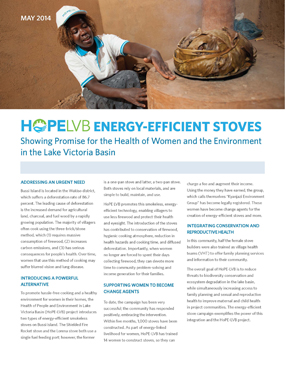HoPE LVB Energy Efficient Stoves
Bussi Island is located in the Wakiso district, which suffers a deforestation rate of 86.7 percent. The leading cause of deforestation is the increased demand for agricultural land, charcoal, and fuel wood by a rapidly growing population. The majority of villagers often cook using the three-brick/stone method, which (1) requires massive consumption of firewood, (2) increases carbon emissions, and (3) has serious consequences for people’s health. Over time, women that use this method of cooking may suffer blurred vision and lung disease. To promote hassle-free cooking and a healthy environment for women in their homes, the Health of People and Environment in Lake Victoria Basin project introduces two types of energy-efficient smokeless stoves on Bussi island.
Related Publications
HoPe LVB Beach Management
A new approach to conservation in the basin is the Health of People and Environment in the Lake Victoria Basin project. It seeks to reduce threats to biodiversity conservation and ecosystem degradation while simultaneously increasing access to family planning and reproductive health services.
HoPE LVB Model Households
Model households are a key aspect of the Health of People and Environment in the Lake Victoria Basin, an integrated Population, Health, and Environment project with sites in Kenya and Uganda.
